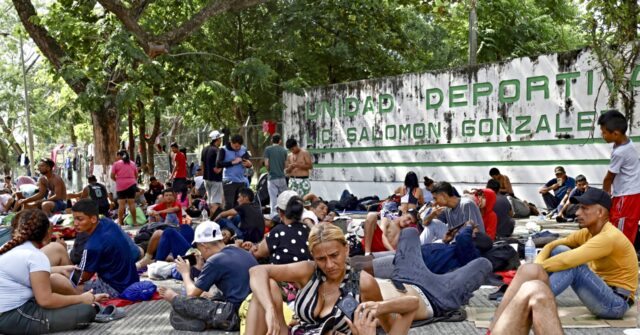The ongoing humanitarian crisis faced by migrants along the U.S.-Mexico border has intensified, particularly since the political implications of the 2024 election have reshaped policies under President Joe Biden’s administration. Many migrants, primarily from Latin America and the Caribbean, are now stranded on their journey northward, which has been exacerbated by the perceived instability in U.S. immigration policy. The situation has led to a growing number of migrants, like Venezuelan national Yuleidi Moreno, expressing their dire circumstances, with heart-felt pleas to return home due to the extreme hardships they face in transit. Reports highlight horrific experiences, including mistreatment by others and the prevalence of sexual abuse, depicting a grim narrative that many are beginning to see as unbearable.
The journey towards the U.S. border has been fraught with danger and uncertainty as migrants navigate through treacherous pathways, including dangerous jungles and human trafficking networks prevalent in Mexico. The statistics paint a stark picture with nearly 30,000 murders occurring annually and over 100,000 individuals reported missing in the country. This environment of violence and exploitation has created immense fear and angst among migrants, who are caught between their hopes for a better life in the U.S. and the harsh realities they face on the ground. Migration expert Todd Benman remarks on the growing sense of despair among these individuals, who sense they are left behind as the political climate shifts against them.
Since 2021, the Biden administration, under the leadership of Secretary of Homeland Security Alejandro Mayorkas, has implemented policies designed to accommodate more migrants. However, this influx has generated significant criticism, particularly regarding the long-term implications for American citizens, including wage stagnation and increased exploitation of low-wage jobs. The controversial policies have not just impacted migrants; they’ve created a rift within communities, as the expectation of legal protection in the U.S. remains uncertain. The consequences extend beyond economic challenges, drawing attention to the tragic social ramifications such as violence against migrants and the breakdown of families left behind.
As many migrants wait in limbo, there is an increasing realization that the legal pathways offered to them may not be as accessible as they once thought. In light of pressure from former President Donald Trump and his administration’s staunch border policies, Mexican law enforcement has intensified their enforcement efforts, forming roadblocks that hinder the migrants’ attempts to reach the U.S. This has led many to slip into despair and, as per Benman’s observations, even a feeling of hopelessness about ever managing to enter the United States. Reports indicate that many migrants are now deep in debt, often reliant on smugglers, with no clear path ahead.
Despite facing challenges that include poverty, insecurity, and political turmoil back home, many migrants report that they are contemplating a return to their countries rather than continue facing uncertain futures in a foreign land. Anecdotal evidence suggests a notable trend of individuals reconsidering their migration decisions, with some weekly requesting support for “voluntary return” to their home countries, driven by a sense of hopelessness about obtaining admittance to the U.S. The feelings among these migrants highlight the tough decisions they must make as the political landscape shifts, especially with the imminent changes anticipated from the 2024 election and a potential Trump presidency.
Yet, amidst these dire circumstances, some continue to cling to the hope that they might still enter the U.S., albeit with a clear understanding of the trauma involved. For instance, Nidia Montenegro, another Venezuelan migrant, is attempting to utilize the U.S. Customs and Border Protection (CBP) One mobile application offer to secure an entry appointment into the U.S. Despite her harrowing journey, she, like many others, faces a heart-wrenching decision: to go back home or risk further suffering in a hostile environment. The intricate web of emotional trauma, shifting political strategies, and harsh realities facing these migrants casts a long shadow over their dreams of safety and stability in a new land.

